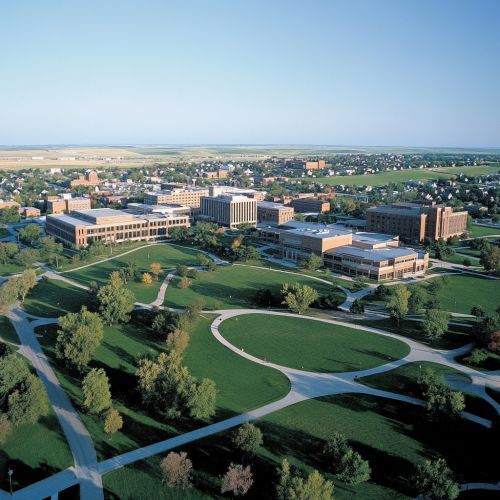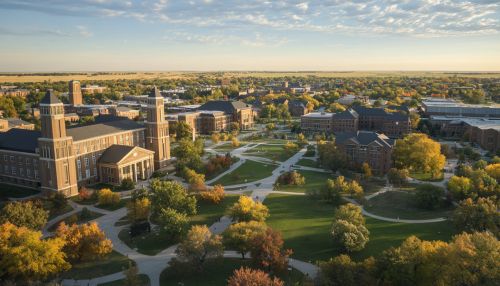Kansas State University
Overview
Kansas State University (KSU) is a public research university located in Manhattan, Kansas, United States. Established in 1863, it was the first public institution of higher learning in the state of Kansas. The university is renowned for its commitment to research, education, and community service. KSU offers a wide range of undergraduate, graduate, and professional programs across multiple disciplines, making it a cornerstone of higher education in the region. The university is a member of the Association of Public and Land-grant Universities and is classified as a Research University with high research activity by the Carnegie Classification of Institutions of Higher Education.


History
Founding and Early Years
Kansas State University was founded on February 16, 1863, as Kansas State Agricultural College. It was established under the provisions of the Morrill Act, which provided federal land to states to finance the establishment of colleges specializing in agriculture and the mechanical arts. The university's early curriculum focused on agriculture, science, and military tactics, reflecting the practical needs of the time.
The first classes were held in the Blue Mont Central College building, which was located on a hill overlooking the city of Manhattan. The college initially struggled with funding and enrollment but gradually expanded its academic offerings and facilities.
Growth and Development
Throughout the late 19th and early 20th centuries, Kansas State University experienced significant growth. The institution expanded its academic programs to include engineering, home economics, and veterinary medicine. In 1931, the college was renamed Kansas State College of Agriculture and Applied Science, reflecting its broader academic mission.
The post-World War II era brought further expansion, with increased enrollment and the construction of new facilities. In 1959, the institution was officially renamed Kansas State University, signifying its status as a comprehensive university with a diverse range of academic programs.
Academics
Colleges and Schools
Kansas State University is organized into several colleges and schools, each offering a variety of programs:
- **College of Agriculture**: Known for its research in agronomy, animal science, and food science, the College of Agriculture plays a vital role in advancing agricultural practices and technologies.
- **College of Engineering**: Offers programs in various engineering disciplines, including mechanical, electrical, and civil engineering. The college is recognized for its research in sustainable energy and infrastructure.
- **College of Veterinary Medicine**: Provides education and training for future veterinarians and conducts research in animal health and disease prevention.
- **College of Arts and Sciences**: The largest college at KSU, offering programs in the humanities, social sciences, natural sciences, and mathematics.
- **College of Business Administration**: Offers undergraduate and graduate programs in business, finance, marketing, and management.
- **College of Education**: Prepares educators and administrators for careers in K-12 and higher education settings.
- **College of Architecture, Planning, and Design**: Known for its innovative programs in architecture, landscape architecture, and interior design.
Research and Innovation
Kansas State University is a leader in research and innovation, with a focus on addressing global challenges. The university's research initiatives are supported by various centers and institutes, including the Biosecurity Research Institute, which conducts research on infectious diseases and food safety.
KSU is also home to the National Agricultural Biosecurity Center, which collaborates with government agencies and industry partners to enhance the security of the nation's food supply. The university's research efforts are bolstered by partnerships with federal agencies, private industry, and other academic institutions.
Campus and Facilities
Main Campus
The main campus of Kansas State University is located in Manhattan, Kansas, and spans over 668 acres. The campus features a mix of historic and modern buildings, with facilities designed to support academic, research, and student life activities. Key buildings on campus include Hale Library, the Marianna Kistler Beach Museum of Art, and the K-State Student Union.
Satellite Campuses
In addition to its main campus, KSU operates several satellite campuses and research facilities across the state. These include the K-State Olathe campus, which focuses on graduate education and research in the Kansas City metropolitan area, and the K-State Polytechnic campus in Salina, which offers programs in aviation and technology.
Student Life
Student Organizations
Kansas State University offers a vibrant student life with over 475 student organizations, including academic clubs, cultural groups, and service organizations. These organizations provide students with opportunities to develop leadership skills, engage in community service, and explore diverse interests.
Athletics
KSU is a member of the Big 12 Conference and competes in NCAA Division I athletics. The university's athletic teams, known as the Wildcats, have a strong tradition of success in sports such as football, basketball, and track and field. The Bill Snyder Family Stadium and Bramlage Coliseum are key venues for athletic events on campus.
Community Engagement
Kansas State University is committed to community engagement and outreach. The university's extension programs provide valuable resources and support to communities across Kansas, focusing on areas such as agriculture, health, and youth development. KSU's commitment to service is reflected in its designation as a Carnegie Community Engagement institution.
Notable Alumni
Kansas State University has produced numerous notable alumni who have made significant contributions to various fields. These include politicians, business leaders, scientists, and artists. Some distinguished alumni include former U.S. Senator Pat Roberts, astronaut Steven Hawley, and Pulitzer Prize-winning journalist Deborah Blum.
